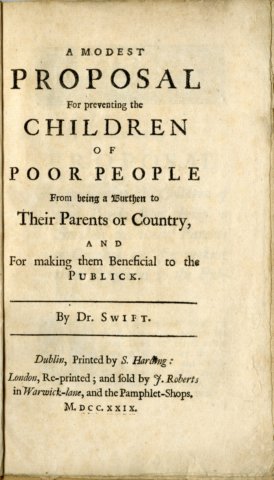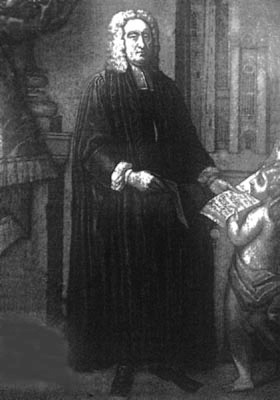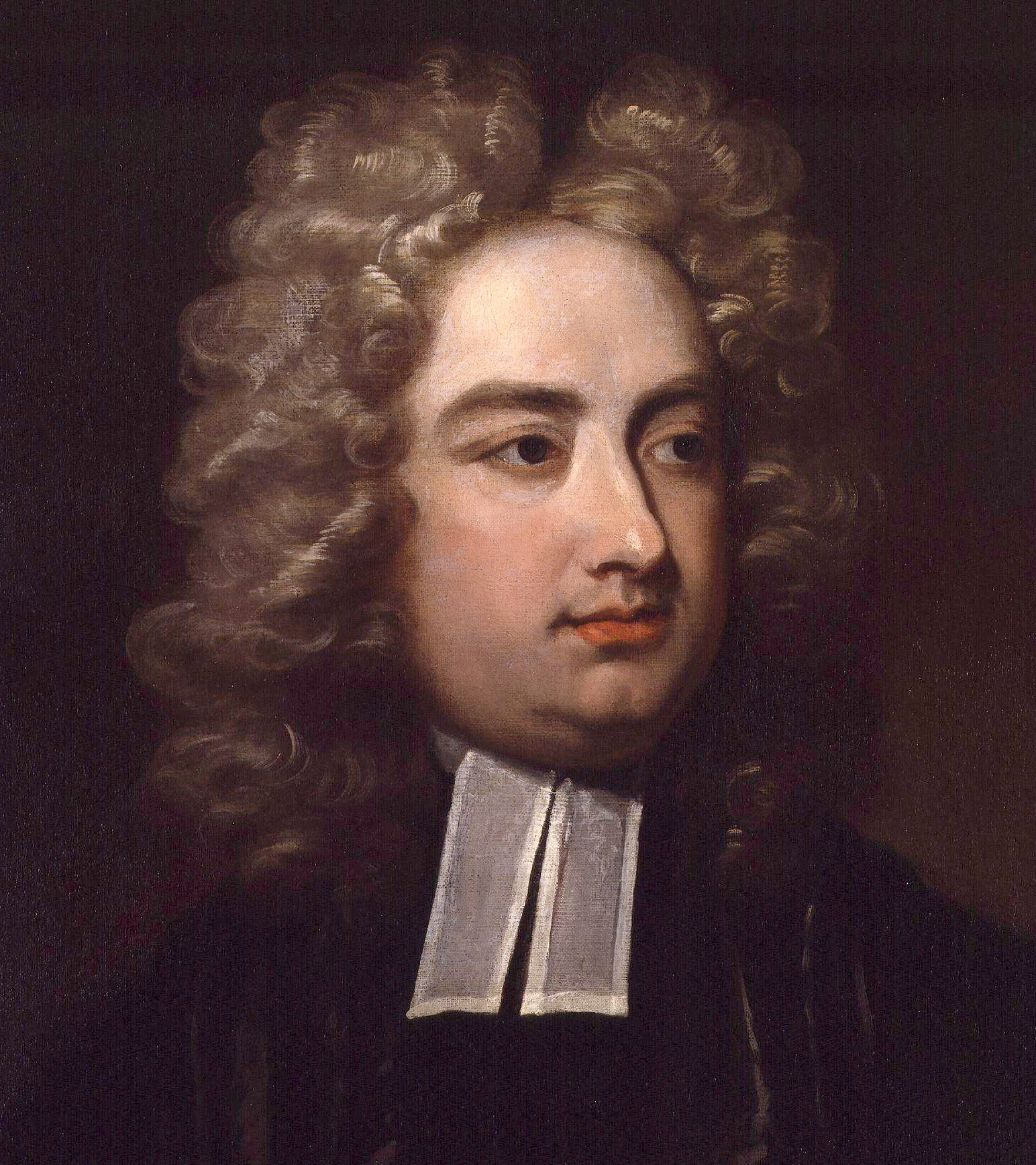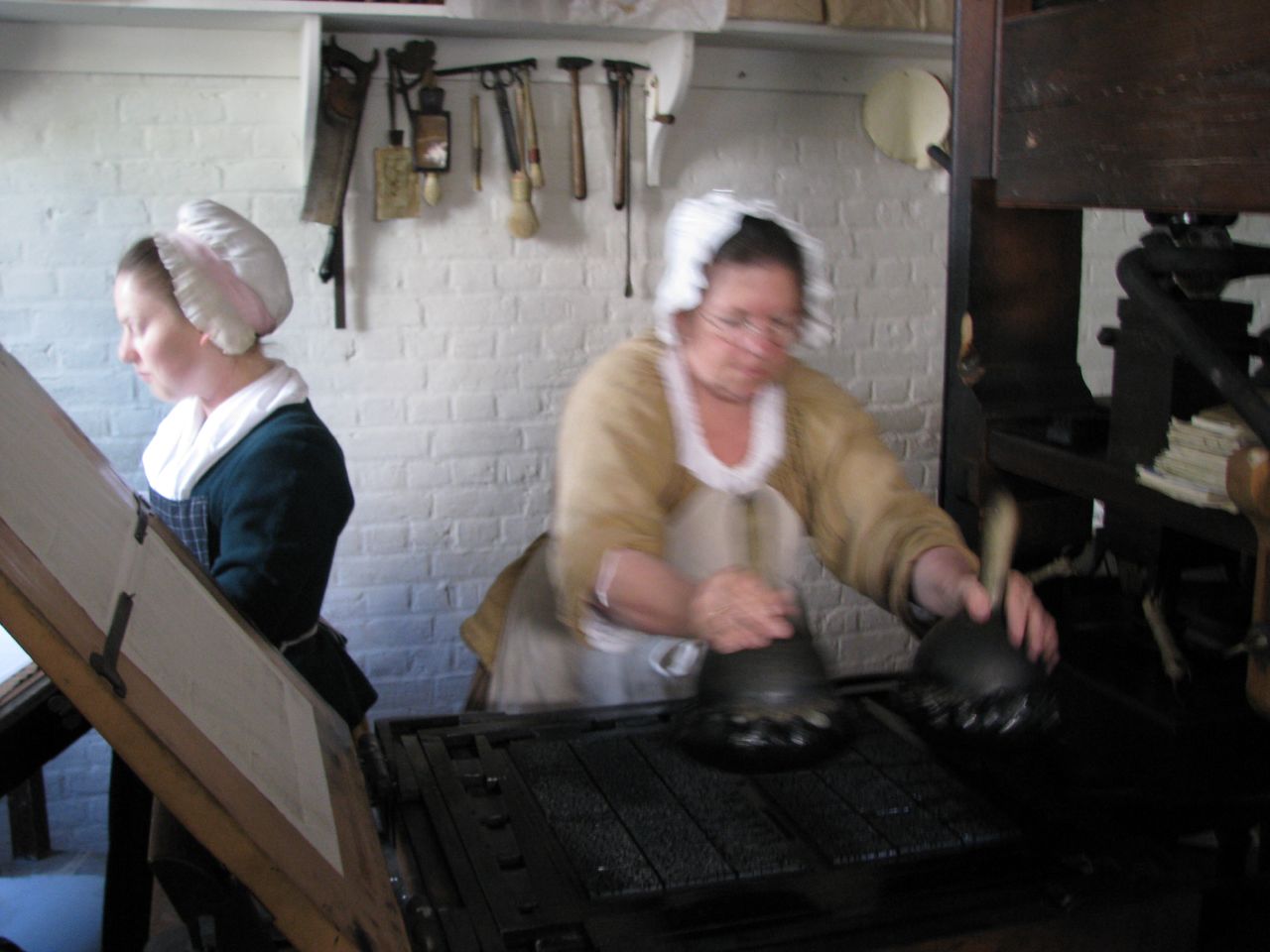|
Sarah Harding (printer)
Sarah Harding (''fl.'' 1721–9) was an Irish printer and publisher who suffered "inopportune imprisonments" for some of her publications. She is known for publishing Jonathan Swift's '' A modest proposal'' in 1729 (A satirical idea that the poor could sell their children as food). Biography Sarah Harding was the wife and business partner of printer John Harding near Fishamble Street, on the Blind Quay, Dublin. Her mother was a well-known Dublin printer, Elizabeth Sadlier, and it is possible that it was this connection that drew John into the printing business. Following her husband's imprisonment for publishing an unauthorised version of the lord lieutenant's speech on the opening of the parliamentary session, Harding took over the printing business. Her first publication was a pamphlet, ''The present miserable state of Ireland'' (1721), that is occasionally attributed to Jonathan Swift. Her husband was released in 1721, and employed by Swift to publish a half-page protest a ... [...More Info...] [...Related Items...] OR: [Wikipedia] [Google] [Baidu] |
Jonathan Swift
Jonathan Swift (30 November 1667 – 19 October 1745) was an Anglo-Irish writer, essayist, satirist, and Anglican cleric. In 1713, he became the Dean (Christianity), dean of St Patrick's Cathedral, Dublin, and was given the sobriquet "Dean Swift". His trademark deadpan and ironic style of writing, particularly in works such as ''A Modest Proposal'' (1729), has led to such satire being subsequently termed as "Swiftian". He wrote the satirical book ''Gulliver's Travels'' (1726), which became his best-known publication and popularised the fictional island of Lilliput and Blefuscu, Lilliput. Following the remarkable success of his works, Swift came to be regarded by many as the greatest satirist of the Georgian era, and one of the foremost prose satirists in the history of English literature. Swift also authored works such as ''A Tale of a Tub'' (1704) and ''An Argument Against Abolishing Christianity'' (1712). He originally published all of his works under pseudonyms—including L ... [...More Info...] [...Related Items...] OR: [Wikipedia] [Google] [Baidu] |
A Modest Proposal
''A Modest Proposal for Preventing the Children of Poor People from Being a Burthen to Their Parents or Country, and for Making Them Beneficial to the Publick'', commonly referred to as ''A Modest Proposal'', is a Juvenalian satirical essay written and published by Anglo-Irish writer and clergyman Jonathan Swift in 1729. The essay suggests that poor people in Ireland could ease their economic troubles by selling their children as food to the elite. Swift's use of satirical hyperbole was intended to mock hostile attitudes towards the poor and anti-Catholicism among the Protestant Ascendancy as well as the Dublin Castle administration's policies in general. In English writing, the phrase "a modest proposal" is now conventionally an allusion to this style of straight-faced satire. Synopsis Swift's essay is widely held to be one of the greatest examples of sustained irony in the history of English literature. Much of its shock value derives from the fact that the first portion ... [...More Info...] [...Related Items...] OR: [Wikipedia] [Google] [Baidu] |
Dictionary Of Irish Biography
The ''Dictionary of Irish Biography'' (DIB) is a biographical dictionary of notable Irish people and people not born in the country who had notable careers in Ireland, including both Northern Ireland and the Republic of Ireland. History The work was supervised by a board of editors which included the historian Edith Johnston. It was published as a nine-volume set in 2009 by Cambridge University Press in collaboration with the Royal Irish Academy (RIA), and contained about 9,000 entries. The 2009 version of the dictionary was also published online via a digital subscription and was predominantly used by academics, researchers, and civil servants. An online version is now open access, having been launched on 17 March 2021 (St. Patrick's Day), and new entries are added to that version periodically. Funding is from the Higher Education Authority, Department of Foreign Affairs, and Dublin City Council Libraries. The biographies range from 200-15,000 words in length, with a ... [...More Info...] [...Related Items...] OR: [Wikipedia] [Google] [Baidu] |
A Modest Proposal 1729 Cover
A, or a, is the first letter and the first vowel letter of the Latin alphabet, used in the modern English alphabet, and others worldwide. Its name in English is '' a'' (pronounced ), plural ''aes''. It is similar in shape to the Ancient Greek letter alpha, from which it derives. The uppercase version consists of the two slanting sides of a triangle, crossed in the middle by a horizontal bar. The lowercase version is often written in one of two forms: the double-storey and single-storey . The latter is commonly used in handwriting and fonts based on it, especially fonts intended to be read by children, and is also found in italic type. In English, '' a'' is the indefinite article, with the alternative form ''an''. Name In English, the name of the letter is the ''long A'' sound, pronounced . Its name in most other languages matches the letter's pronunciation in open syllables. History The earliest known ancestor of A is ''aleph''—the first letter of the Phoenician ... [...More Info...] [...Related Items...] OR: [Wikipedia] [Google] [Baidu] |
John Harding (printer)
John Harding is the name of: *John Harding (Leicester MP), British politician who represented Leicester (UK Parliament constituency) in 1338? * John Harding (President of Magdalen) (died 1610), English churchman and academic * Sir John Harding (1809–1868), Queens Advocate * John Harding (Southern planter) (1777–1865), American Southern planter and Thoroughbred breeder * John Harding (cricketer) (fl. 1809), English cricketer *John Harding (bishop) (1805–1874), bishop of Bombay * J. Eugene Harding (1877–1959), U.S. Representative from Ohio *John Harding, 1st Baron Harding of Petherton (1896–1989), British Second World War general, Chief of the Imperial General Staff and Governor of Cyprus * John Harding, 2nd Baron Harding of Petherton (1928–2016), British Army officer * John L. Harding (1780–1837), American mayor of Frederick, Maryland * Jack Harding (1898–1963), American coach of American football * J. P. Harding (1911–1998), British zoologist * John Harding (footba ... [...More Info...] [...Related Items...] OR: [Wikipedia] [Google] [Baidu] |
Fishamble Street
Fishamble Street (; ) is a street in Dublin, Ireland within the old city walls. Location The street joins Wood Quay at the Fish Slip near Fyan's Castle. It originally ran from Castle Street to Essex Quay until the creation of Lord Edward Street in 1886. History It is mentioned in the 14th century as ''Vicus Piscariorum'', ''Viscus Piscariæ'', and as Fish Street. In 1577, Stanihurst named it St John's Street. In the fifteenth century, it was referred to as "the Fishamyls". John Estrete, the eminent judge and statesman, owned a house here in 1483, which he sold to Philip Fleming two years later. In 1610, some editions of Speed's map call it Fish Shambles. During the 1950s it was for a time officially considered part of Moore Street, though in practice it retained its separate identity. The street was known as the official fish market for Dublin until the end of the 17th century when the city markets were moved to the north bank of the Liffey. (''" Shambles"'' were meat ... [...More Info...] [...Related Items...] OR: [Wikipedia] [Google] [Baidu] |
Dublin
Dublin is the capital and largest city of Republic of Ireland, Ireland. Situated on Dublin Bay at the mouth of the River Liffey, it is in the Provinces of Ireland, province of Leinster, and is bordered on the south by the Dublin Mountains, part of the Wicklow Mountains range. Dublin is the largest city by population on the island of Ireland; at the 2022 census of Ireland, 2022 census, the city council area had a population of 592,713, while the city including suburbs had a population of 1,263,219, County Dublin had a population of 1,501,500. Various definitions of a metropolitan Greater Dublin Area exist. A settlement was established in the area by the Gaels during or before the 7th century, followed by the Vikings. As the Kingdom of Dublin grew, it became Ireland's principal settlement by the 12th century Anglo-Norman invasion of Ireland. The city expanded rapidly from the 17th century and was briefly the second largest in the British Empire and sixth largest in Western Europ ... [...More Info...] [...Related Items...] OR: [Wikipedia] [Google] [Baidu] |
Drapier's Letters
''Drapier's Letters'' is the collective name for a series of seven pamphlets written between 1724 and 1725 by the Dean of St Patrick's Cathedral in Dublin, Jonathan Swift, to arouse public opinion in Ireland against the imposition of a privately minted copper coinage that Swift believed to be of inferior quality. William Wood was granted letters patent to mint the coin, and Swift saw the licensing of the patent as corrupt. In response, Swift represented Ireland as constitutionally and financially independent of Britain in the ''Drapier's Letters''. Since the subject was politically sensitive, Swift wrote under the pseudonym ''M. B., Drapier'', to hide from retaliation. Letter 1 Intro Note Although the letters were condemned by the Parliament of Ireland, with prompting from the Parliament of Great Britain, they were still able to inspire popular sentiment against Wood and his patent. The popular sentiment turned into a nationwide boycott, which forced the patent to be with ... [...More Info...] [...Related Items...] OR: [Wikipedia] [Google] [Baidu] |
Thomas Sheridan (divine)
Thomas Sheridan (1687 – 10 October 1738) was an Anglicanism#Anglican divines, Anglican divine, essayist, playwright, poet, schoolmaster and translator. He is chiefly remembered for his friendship with Jonathan Swift. Family and early career He was born in Cavan, Ireland, the son of James Sheridan, and grandson of The Reverend Dennis Sheridan. Two of his uncles were Church of Ireland prelates: The Right Reverend, The Rt Rev. William Sheridan (Irish bishop), William Sheridan, Bishop of Kilmore and Ardagh, and The Right Reverend, The Rt Rev. Patrick Sheridan, Cloyne, Patrick Sheridan, Bishop of Cloyne. After graduating from Trinity College, Dublin, he married Elizabeth MacFadden and the couple first lived in Dublin in King James's Mint. He inherited from his father-in-law a substantial property at Quilca, near Mullagh, County Cavan, Mullagh, in County Cavan. He ran a school in Capel Street, Dublin, in the 1720s, whose pupils included children of many prominent families such as ... [...More Info...] [...Related Items...] OR: [Wikipedia] [Google] [Baidu] |
A Modest Proposal
''A Modest Proposal for Preventing the Children of Poor People from Being a Burthen to Their Parents or Country, and for Making Them Beneficial to the Publick'', commonly referred to as ''A Modest Proposal'', is a Juvenalian satirical essay written and published by Anglo-Irish writer and clergyman Jonathan Swift in 1729. The essay suggests that poor people in Ireland could ease their economic troubles by selling their children as food to the elite. Swift's use of satirical hyperbole was intended to mock hostile attitudes towards the poor and anti-Catholicism among the Protestant Ascendancy as well as the Dublin Castle administration's policies in general. In English writing, the phrase "a modest proposal" is now conventionally an allusion to this style of straight-faced satire. Synopsis Swift's essay is widely held to be one of the greatest examples of sustained irony in the history of English literature. Much of its shock value derives from the fact that the first portion ... [...More Info...] [...Related Items...] OR: [Wikipedia] [Google] [Baidu] |
George Faulkner
George Faulkner (c. 1703 – 30 August 1775) was one of the most important Irish publishers and booksellers. He forged a publishing relationship with Jonathan Swift and parlayed that fame into an extensive trade. He was also deeply involved with the argument over copyright infringement and piracy, both creating and fighting "Irish editions". Faulkner's year of birth, which is not certain, was probably 1703; his place of birth is unknown. He served his apprenticeship from 1717 to 1724 in Dublin, later setting up his own business. In the 1720s, while travelling frequently to London, he became a friend of the London printer, William Bowyer. In 1730, he suffered gangrene in one leg and had to have it amputated. It is known that he had a wife, the widow, Mary Taylor. Relationship with Swift Swift's usual printer during the 1720s was Benjamin Motte in London, but Faulkner published Swift's ''Drapier's Letters'' in 1725. The details of how and why Faulkner got this assignment are obs ... [...More Info...] [...Related Items...] OR: [Wikipedia] [Google] [Baidu] |
List Of Women Printers And Publishers Before 1800
This list of women printers and publishers before 1800 includes women active as printers or publishers prior to the 19th century. Before the printing press was invented, books were made from pages written by scribes, and it could take up to a year or two for a book to be completed. Books were a luxury mainly for religious scholars and the upper classes. Johannes Guttenberg invented the printing press around 1450, which allowed for mass production of books. Having books become more widely available meant that a wider range of people had access to information, but this threatened the authority of the state. Some printers had their works censored and may have been jailed for disseminating information of which the state did not approve. Printing required setting type and running the press itself, which could be arduous, as well as bookbinding. Although running the press was considered too physically difficult, many women were able to do all the jobs required to produce a book. Genera ... [...More Info...] [...Related Items...] OR: [Wikipedia] [Google] [Baidu] |







